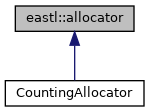#include <allocator.h>

Public Member Functions | |
| EASTL_ALLOCATOR_EXPLICIT | allocator (const char *pName=EASTL_NAME_VAL(EASTL_ALLOCATOR_DEFAULT_NAME)) |
| allocator (const allocator &x) | |
| allocator (const allocator &x, const char *pName) | |
| allocator & | operator= (const allocator &x) |
| void * | allocate (size_t n, int flags=0) |
| void * | allocate (size_t n, size_t alignment, size_t offset, int flags=0) |
| void | deallocate (void *p, size_t n) |
| const char * | get_name () const |
| void | set_name (const char *pName) |
Detailed Description
allocator
In this allocator class, note that it is not templated on any type and instead it simply allocates blocks of memory much like the C malloc and free functions. It can be thought of as similar to C++ std::allocator<char>. The flags parameter has meaning that is specific to the allocation
C++11's std::allocator (20.6.9) doesn't have a move constructor or assignment operator. This is possibly because std::allocators are associated with types instead of as instances. The potential non-equivalance of C++ std::allocator instances has been a source of some acknowledged design problems. We don't implement support for move construction or assignment in eastl::allocator, but users can define their own allocators which do have move functions and the eastl containers are compatible with such allocators (i.e. nothing unexpected will happen).
The documentation for this class was generated from the following file:
- third_party/EASTL/include/EASTL/allocator.h